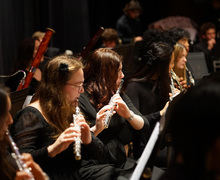Emily Engstler has become a defensive force in her 1st season
Max Freund | Staff Photographer
Engstler, pictured against Wake Forest, has offered an interior stopper to a defense that's allowed 29 points in the paint per game in the last four contests.
The three blocks, edited together in a neat, 21-second clip, ended with the same celebration. The first, and most-recent, against Wake Forest featured a leap to the wing. The second — in the KFC Yum! Center against the then-No. 2 team in the country — was a chase-down block. The third, and first collegiate block by Emily Engstler, sparked uproar from the Carrier Dome crowd as she straightened her shoulders and walked back on defense.
At 11:47 a.m. on Feb. 19, Syracuse head coach Quentin Hillsman tweeted a highlight reel of Engstler’s best plays through her 25 collegiate games, most of which have come on the defensive end. Her 3.4 blocks per 40 minutes leads the team. Hillsman added a flexing-arm emoji and a word to describe Engstler’s defensive presence in recent weeks: Enforcement.
“(Blocks are) fun, man,” Engstler said while smirking after a recent practice. “They make the game fun. I’d rather have a block than a 3 any day.”
Emily is averaging 3.4 blocks/40 min, leading the team. Enforcement ?? pic.twitter.com/RZ4ETkhYqa
— Quentin Hillsman (@CoachQatSU) February 19, 2019
Lauded for her passing and shooting, Engstler hasn’t developed into an offensive playmaker while adjusting to Division I’s pace of play. Hillsman has benched her on multiple occasions for not hustling down the court.
Instead, the No. 9 recruit’s highs in her “roller coaster” first season have come in the form of thundering swats. Operating usually on the wing of the Orange’s 2-3 zone, she’s totaled more blocks (31) than 3-pointers made (13). Her athleticism has translated in an unexpected way, she said. With No. 18 Syracuse’s (19-6, 8-4 Atlantic Coast) interior defense’s struggling of late — its allowed 29 points in the paint per game in the last four contests, including two losses to a pair of ranked opponents — its best rim protector might be Engstler.
“I think it’s natural,” Engstler said. “… Sometimes it doesn’t work, but I’m mostly a risk-taker when it comes to blocking shots, and I don’t mind sometimes.”
Though Hillsman has lauded the Orange’s positionless system, the coaching staff tried to establish a consistent role for Engstler. Associate head coach Vonn Read assisted in her offensive game. Assistant coach Tammi Reiss helped improve her ball-handling as a guard and Adeniyi Amadou, who coaches forwards, worked with Engstler on her post-protection. Hillsman focused on “little things” like communication and holding her hands out when receiving a pass.
Hillsman summarized Engstler’s early challenge in late October: One of Engstler’s best traits, her versatility, hindered her from carving out a niche on Syracuse’s deep roster.
“It’s a lot of different things,” Hillsman said of Engstler’s struggles. “For me, it’s really more about how much is she gonna work? How much effort is she gonna put into becoming a better player?”
In the preseason, Hillsman said Engstler and Kadiatou Sissoko, another top-recruit who could stretch the floor, performed well on the defensive end. They handled smaller guards on the wing — a staple of the 2-3. The two also denied passes inside. Senior forward Miranda Drummond noticed Engstler’s aggressiveness in early workouts before the season. Yet, Hillsman warned, until Engstler faced the “live fire” of in-game competition, it would be a wait-and-see process.
Through her first games, what he first saw didn’t trouble him, but it wasn’t to his expectations. Poor positioning inside led to fouls. Engstler sporadically hustled between possessions, an affront to the system the program is built on. And when she got benched against Maryland Eastern Shore on Dec. 5, she shook her head and walked past Hillsman before plopping down on a padded seat.
“She came in with a pretty solid skillset around the board,” Hillsman said before conference play began. “We’re trying to get her to understand the speed of the game and at this level, some of the passes and decisions you make in high school might not work.”
At Christ The King (New York) High School and St. Francis Preparatory (New York) School, Engstler said she didn’t have to run as hard as often. She was faster than most of her competition. At Syracuse, the game was faster than her. When Engstler recognized that consistent effort would keep her on the court, she reorganized her game.
Through mid-January, she used her passing to become a facilitator on offense. As her minutes ticked up, she was allowed to roam the wing and thrive defensively. Ryan Cabiles, strength and conditioning coach for both of SU’s basketball programs, helped Engstler control her body-positioning while leaping and landing for blocks. She admitted she doesn’t have an elite jumping ability. Instead, Engstler’s anticipation and timing set her apart. It’s put her back on the court, and it could help her stay there.
After SU’s second-consecutive ranked loss on Feb. 13, Hillsman rubbed his temple at his postgame press conference. The Orange’s interior defense was gashed, again, and center Maeva Djald-Tabdi was repeatedly a step behind Wolfpack forwards.
Engstler totaled six points, two blocks and a steal but only played 11 minutes. With the stats in front of him, Hillsman pondered if Engstler, long a question mark, should’ve played more. Her interior defense could provide an answer to Syracuse’s most-pressing issue.
“She’s sneaky deceptive and athletic,” Hillsman said in early February. “She makes some plays you think she probably couldn’t make, and she makes the right plays. So, just gotta continue to get her better, continue to get her to play our pace, and once she does that, she’ll be really good.”
— Senior staff writer Eric Black contributed reporting to this story.
Published on February 21, 2019 at 12:32 am
Contact Nick: nialvare@syr.edu | @nick_a_alvarez






